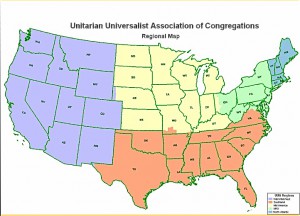This afternoon, I attended a webinar offered by Linda Laskowski, on “regionalization” — that’s the current catchphrase for a jumble of attempts to reorganize the field staff of the Unitarian Universalist Association (UUA). Like most for-profit and non-profit organizations, the UUA has been forced to look for ways to increase efficiency and reduce staff expenditures; personally, I suspect some form of regionalization will eventually be necessary as a way to cut costs and increase efficiency.
Many of the regionalization ideas floating around include shutting down or merging one or more of the 19 districts; districts are the organizations which provide some of the funding for UUA field staff. But Laskowski said that this kind of regionalization is not something with which the UUA Board is concerned, or with which the Board can be concerned. She pointed out that the UUA Board cannot have a plan for shutting down or merging district organizations because they are all 501(c)3 organizations with a separate corporate existence from the UUA.
Laskowski said the UUA’s regionalization initiatives include a couple of instances of helping districts share staff. More importantly, the UUA assigns districts to one of five large geographical regions (see map below), and appoints one district executive to serve as the head district executive for that region (e.g., Ken Brown, district executive for the Pacific Southwest district, serves as the lead district executive for the far western region). Most importantly, the UUA Board will ask General Assembly to reduce the number of its members; currently, each district elects one board member, so a reduction in the number of board members would mean that would no longer be the case.

The current UUA regions
Susan Ritchie, Visiting Professor of Unitarian Universalist Heritage and Ministry at the Starr King School for the Ministry, offered historical perspectives on districts and regionalization. She offered a wealth of details which served to demonstrate that much of the current district governance structure within the UUA is a result of historical accidents. Laskowski expressed her opinion that the current organizational structure of the UUA does not work as well as it should, to the point where some kind of reorganization is necessary.
This webinar was offered to ministers of the Pacific Central District (PCD). A couple of webinar participants pointed out that one significant barrier to regionalization in the PCD will be the negative feelings that have resulted from the UUA’s decision to withdraw from co-employing Cilla Raughley, PCD District Executive; because of the way Raughley’s contract was written, that led to her termination. Laskowski reminded webinar participants that the Pacific Central District is a separate corporate entity, and that regionalization cannot be imposed by the UUA; it will be up to the PCD to decide whether or not to participate in any regionalization efforts that may happen.
A brief footnote: I attended the webinar on site at the Starr King School for Ministry, along with half a dozen other PCD ministers. After the webinar was over, some of us chatted briefly. Susan Ritchie said that it’s remarkable how many people continue to believe that UUA Board has some kind of plot to take over the districts, when that is clearly impossible and clearly is not on the Board’s long-range agenda. I said the UUA needed to pass out tin-foil hats. You know, to protect us all from the evil rays that the UUA is beaming into our heads to convince us to give up our individual identity and become part of the UUA Borg. In fact, I’m wearing mine now:

Me in my tin-foil hat. Look, you can see the evil rays coming in at me from the skylight behind me.


